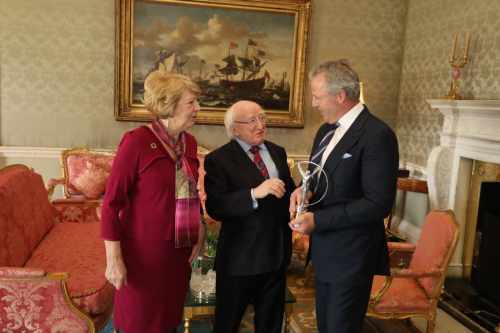Speech at the 10th anniversary of The Samaritans Listeners Programme in Mountjoy Prison
Mountjoy Prison, Dublin, Tuesday 17 April 2018
Tá áthas orm a bheith anseo inniu chun cothrom 10 mbliana an clár "Listener" i bPríosún Mhuinseo a chomóradh. Cúis mór sásaimh dom is ea an t-eolas go bhfuil an clár, a thosaigh sa phríomh-phríosún sa bhliain 2018, ar fáil trasna a champais ar fad.
I am delighted to be here today to mark the 10th Anniversary of the Listener programme in Mountjoy prison. I am so pleased that a programme which started in the main prison in 2008 now, I understand, operates campus wide.
We owe so much to the work of the Samaritans, which is well known within our society. Generous citizens, who are its members, have for over half a century been reaching out a hand of friendship and support to fellow citizens in Ireland whose lives have been shadowed by difficulty and despair. They have been volunteering their time and their life experience. By doing so have made a profound and positive impact on many lives. Indeed, they have rescued many citizens from situations where their life no longer seemed worth living.
We know of their work, and we are deeply grateful for it. Today we also acknowledge and celebrate the extension of that generosity into Mountjoy Prison through the Samaritans’ Listeners Scheme. This programme commenced in Irish prisons in 2002, and I am glad to hear that it is continuing to go from strength to strength.
It is encouraging to know that today, across the prison Estate there are currently schemes running in the Midlands Prison, Limerick, Arbour Hill, Castlerea, Cork, Cloverhill, Wheatfield and of course in Mountjoy. I also understand that the Irish Prison Service and the Samaritans are currently in the process of setting up schemes in Shelton Abbey and Portlaoise Prison.
Here in Mountjoy Prison the Samaritans have successfully trained almost 180 Listeners across the Campus and I believe that, over the last ten years, the Listeners have received over 5000 calls from fellow prisoners in need of friendship and support.
That is a figure which speaks of just how vital such support from within the prison community is to the improvement of prisoner welfare and healthcare within prisons. The volunteers involved in these projects are hugely effective in promoting dignity of care, benefitting both prisoners at risk and prison staff charged with keeping prisoners safe.
It is a figure that also reminds us of the community spirit that exists in prisons, and of how our prisons share challenges and difficulties similar to those faced by all communities. The prison community comprises men and women who, like the rest of society, are struggling to cope with their shared vulnerabilities.
When Nelson Mandela reflected on his Robben Island experiences on returning there in 1994 he said: "wounds that can't be seen are more painful than those that can be seen and cured by a doctor.”
Assisting prisoners to meet their mental health needs is an essential step to ensuring that when a person is released from prison that they can rebuild their lives fully in the community. Indeed, failure to address the mental health needs of prisoners could have a devastating effect beyond the prison gates.
While we know that there is a high incidence of mental illness amongst prisoners in Ireland, there is sadly a dearth of research into this area. Continuing to explore and initiate new measures to improve mental health amongst prisoners is vital if we are to ensure that all prisoners receive ethical care and are enabled to make the choices that will help them to rebuild their lives and envision futures of hope and possibility.
The Listeners Scheme has been a very positive step forward in addressing the challenge of reducing the prevalence of mental illness in our prisons. We must constantly strive, however, to ensure that we do not lose sight of the emotional wounds that shadow the lives of so many prisoners, follow them out of the prison gates, and continuing to shade and darken their lives as they try to re-integrate into society.
Every prisoner has their own individual story to tell; stories of successes and failures; achievements and mistakes; regrets for past actions and hopes for better futures. They are stories that will continue to be written throughout their time in prison and, while the operation of a Listeners’ Scheme is primarily aimed at the provision of emotional support for vulnerable prisoners, it is also a very important vehicle for assisting in the development of skills, knowledge and self-awareness for those participating.
While the road that leads each prisoner to Mountjoy is an individual one, their shared experience of prison life allows them a profound understanding of the challenges being faced by their fellow prisoners. That insight and empathy is key to the spirit of the Listeners scheme and to the strength of the support it can offer to prisoners in distress or at risk.
May I, at this point, express my admiration for the generous and altruistic members of the prison community who volunteer to be Listeners. Despite your own problems and challenges, you have chosen to make yourselves available to other prisoners, to listen to their problems and guide them through a fragile or dark moment in their lives.
That is something of which you can be very proud indeed.
Time and time again we see evidence of how the act of giving to your community can, in itself, be a rewarding and life changing experience; providing fulfilment, a close connection to the community and the unlocking of skills and potential.
I was delighted to learn that research has shown that Listeners themselves experience profound personal changes through their participation in the scheme, discovering qualities they never thought they had – including empathy, emotional intelligence and an ability to effectively communicate with a fellow human being in distress. As a result of their participation, Listeners have described higher levels of confidence, self-control, patience and pride in themselves and their work.
I understand that the scheme also promotes positive relationships between staff and prisoners, building up trust and understanding of capacity of listeners and support they can provide to the whole prison team, working to improve mental ill health. It also promotes positive relationships between prisoners and their families, enhancing communication and post release confidence to engage with other services and providing a key link between the prisoner and their family which can be critical to the difficult process of reintegration following completion of a term in prison.
May I conclude, therefore, by thanking everyone involved in the Listeners scheme here in Mountjoy Prison: the Samaritan volunteers who play an important role in selecting and training prisoners who have expressed an interest in becoming a Listener; the Irish Prison Service for introducing this very important scheme for the benefit of the prisoners in our care; the volunteer Listeners who have given their time and commitment, without remuneration, to this project; and finally those who have the courage to acknowledge that they need help and support. By utilising this important service you are demonstrating a genuine will to craft a better future for yourselves and your families and that is greatly commendable.
Ba mhaith liom mo bheannacht a thabhairt do gach duine atá páirteach sa tionscadal seo don todhchaí agus tá súil agam go mbeidh rath ar an scéim Éisteora ar fud chóras na bpríosún.
Go raibh maith agaibh.
I would like to wish everyone involved in this project well for the future and hope that the Listener scheme continues to flourish throughout the prison system.
Thank you.


